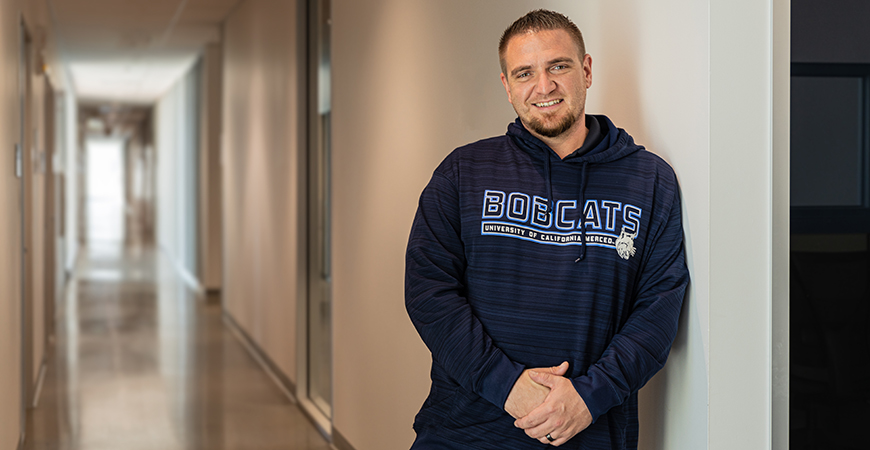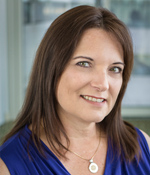
In his early 20s, Cory Mccullough battled addiction and stole to support his habits. The Dos Palos native spent several stints in prison as early as 2011 for commercial burglary. Education was the last thing on his mind.
Now, the former inmate finds himself in the joint again, this time not behind bars but helping incarcerated people forge their paths to higher education.
The third-year UC Merced Ph.D. candidate is using his experiences and education to teach incarcerated students through the Merced College Rising Scholars Program. The program partners with the California Department of Corrections and Rehabilitation and serves 600 students at two state prisons in Chowchilla: Valley State Prison and Central California Women's Facility.
“Most of the people in the prison system are suffering from some kind of addiction,” Mccullough said. “They are exceedingly driven (as students) because they don't want to go back to where they've been.”
Incarcerated students in the program take face-to-face classes (except during the pandemic when the program had to pivot to correspondence courses) and complete the same coursework as regular students, but they are limited to taking nine units a semester. Once they earn their associate’s degrees at Merced College, they can apply to the bachelor’s completion program at Fresno State.
The turning point for Mccullough originated in his decision to enroll in community college so he could make a life for his kids.
“I signed up at Merced College the first time in 2012. Then I got a job, so I decided not to go,” he said. After a mishap at his painting job, he quit and enrolled again in 2014 as an addiction studies major.
While he never put much effort into schoolwork, Mccullough excelled in college and was a member of two honor societies: Phi Theta Kappa and Alpha Gamma Sigma.
At Merced College, he met English instructor Jennifer McBride who served as faculty advisor Alpha Gamma Sigma. She said Mccullough “excelled to such a degree he was nominated for a scholarship and was awarded it.” It was in that scholarship essay she learned of his former incarcerations.
During his first semester, he took a test to help guide him toward the best career path. The first suggestion was a forest ranger, but he knew they wouldn’t give a convicted felon a gun. The second was a photographer, but he had six mouths at home to feed. The third recommendation was an electrical engineer. After looking up the salary range, he decided engineering was the smartest route to take.
Mccullough later found his passion was math.
“I was really nervous about my first math class because I paid someone to do my algebra for me so I could finish high school,” he admitted. “At college, I got the highest grade in the class and continued to do so.”
He transferred to UC Merced in 2017 and graduated in 2019 with a bachelor’s degree in applied mathematics with an emphasis in computation and data science, and continued on in the Applied Mathematics Graduate Program focusing on acoustic wave propagation and scattering with professors Arnold Kim and Camille Carvalho.
Last year, Mccullough applied to teach at Merced College to earn extra income and gain more teaching experience. Unrelated, he reached out to McBride about a student who he thought would be good fit for Alpha Gamma Sigma.
McBride, who has led the Rising Scholars for the past six years as its faculty coordinator, remembered about his past imprisonment and asked if he’d consider teaching at the prisons.
“We were looking for math teachers and we thought he would be a really good fit for the program,” McBride said. “Formerly incarcerated teachers have a window into the students they are serving; they are able to meet them where they are at.”
Although Mccullough started his first semester of teaching statistics for the program in August with a reduced presence, he immediately realized the men and women in his classes are trying to do something to improve their lives.
“In my opinion, the students in the prison system are the best students,” he said. “One student, who’s probably 75 and has been in prison since the ’70s, told me he worked on a homework problem for seven hours. I said, ‘You did what?’ He said he worked on it for three hours and it was really bothering him. So, he did a similar problem with the answer in the back of the book. He worked on that one for a couple hours and got the numbers to match. Then he went back to first one and worked on it for three more hours. He got frustrated so he worked out on the yard and then he came back and worked on it again. I thought, ‘Wow, this is only a homework question.’
“No other students I know have that kind of dedication.”
Like Mccullough recognized, education can be the key to changing circumstances.
“It means a lot for me to go in there and show them that they can do something different with their lives,” Mccullough said.

Senior Public Information Representitive
Office: (209) 228-4203
Mobile: (209) 628-8263